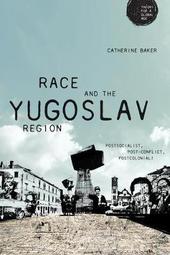
|
Race and the Yugoslav Region: Postsocialist, Post-Conflict, Postcolonial?
Hardback
Main Details
| Title |
Race and the Yugoslav Region: Postsocialist, Post-Conflict, Postcolonial?
|
| Authors and Contributors |
By (author) Catherine Baker
|
| Series | Theory for a Global Age |
|---|
| Physical Properties |
| Format:Hardback | | Pages:256 | | Dimensions(mm): Height 216,Width 138 |
|
| ISBN/Barcode |
9781526126603
|
| Classifications | Dewey:305.8009497 |
|---|
| Audience | | Tertiary Education (US: College) | | Professional & Vocational | |
|---|
|
Publishing Details |
| Publisher |
Manchester University Press
|
| Imprint |
Manchester University Press
|
| Publication Date |
3 April 2018 |
| Publication Country |
United Kingdom
|
Description
This is the first book to situate the territories and collective identities of former Yugoslavia within the politics of race - not just ethnicity - and the history of how ideas of racialised difference have been translated globally. The book connects critical race scholarship, global historical sociologies of 'race in translation' and south-east European cultural critique to show that the Yugoslav region is deeply embedded in global formations of race. In doing this, it considers the everyday geopolitical imagination of popular culture; the history of ethnicity, nationhood and migration; transnational formations of race before and during state socialism, including the Non-Aligned Movement; and post-Yugoslav discourses of security, migration, terrorism and international intervention, including the War on Terror and the present refugee crisis. -- .
Author Biography
Catherine Baker is Senior Lecturer in Twentieth Century History at the University of Hull -- .
Reviews'Catherine Baker bravely focuses on what many scholars working on Yugoslavia, post-Yugoslav nations, and/or the Balkans have avoided or not been able to grapple with: race.' Sociology of Race and Ethnicity 'The book is a poignant study of race and references an extensive and rich amount of literature. It fills an important gap in scholarship on Yugoslavia and Southeast Europe which often lacks a critical analysis of race. I believe it is a necessary read for those interested in Southeast and East European Studies, as well as postsocialism studies. Those interested in critical race theory, postcolonial studies, cultural studies, history, and anthropology will obtain a great deal from the text.' The Anthropology of East Europe Review -- .
|